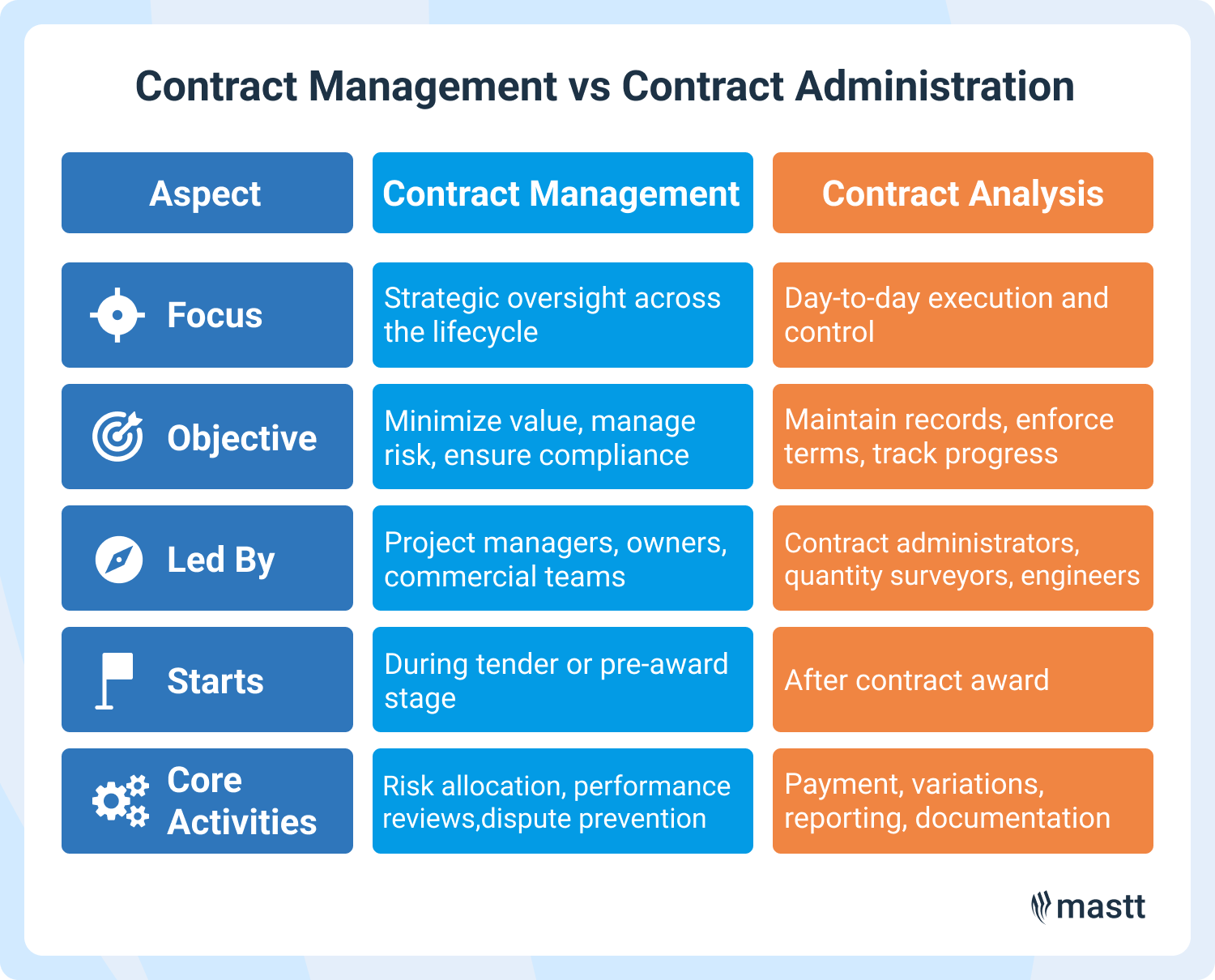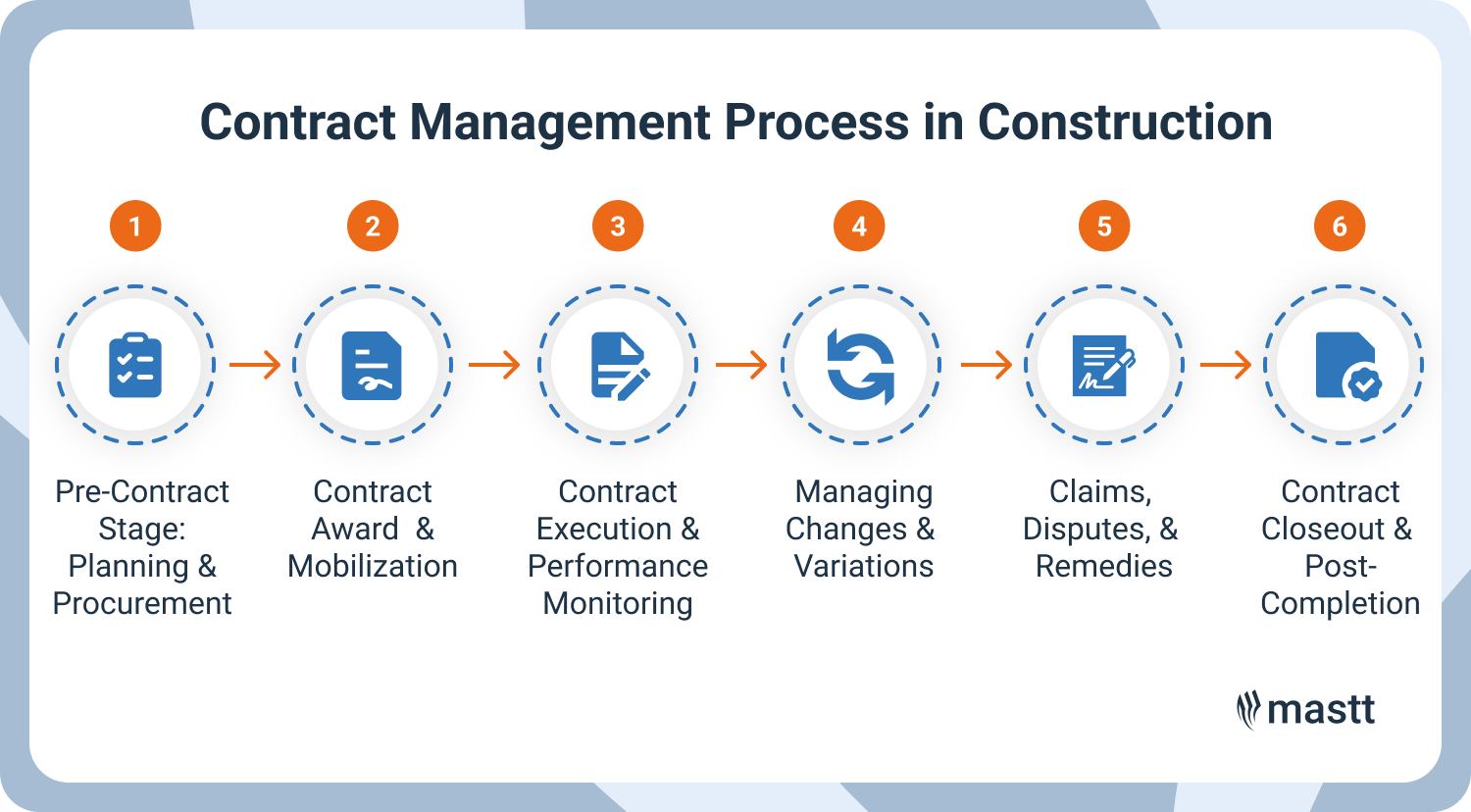Contract management in construction is how teams handle contracts, costs, and compliance. Learn the steps, roles, and tools to manage contracts effectively.

Use this FREE Contract Management Dashboard to track contracts, change orders, invoices, and KPIs in one connected view. Simplify reporting, improve compliance, and keep every contract decision accurate.

Contract management covers the entire process of planning, executing, and overseeing agreements between project parties. It ensures every obligation, payment, and change in a construction contract is handled correctly throughout the project lifecycle.
In this article, we’ll cover what contract management means in construction, how it differs from contract administration, and why it matters. We’ll also talk about how technology and AI are changing the way contracts are managed.
Contract management in construction is the process of overseeing a contract from start to finish to make sure every party meets its obligations. It covers planning, negotiation, execution, performance monitoring, and contract closeout.
In practice, it means managing how the contract terms are applied on site, including tracking payments, handling changes, monitoring performance, and documenting compliance. The goal is to protect the project’s budget, schedule, and quality while reducing risk for both the owner and the contractor.
Contract management oversees the full contract lifecycle, focusing on strategy, risk, and performance to meet project goals and compliance. Contract administration handles daily tasks like payments, changes, correspondence, and record keeping to ensure the contract runs smoothly and follows agreed terms.
Here’s how the two differ in scope and responsibility:

In short, management sets the direction, while administration keeps the process running smoothly. One ensures the contract delivers what was promised; the other makes sure the paperwork and actions match what was agreed.
Contract management gives project managers and owners full visibility into how contracts shape cost, performance, and compliance across the project. It helps control financial exposure, prevent disputes, and ensure every obligation is met on time and within scope.
Here’s what effective contract management can do for construction projects:
A well-managed contract acts like a project roadmap. For example, when a project team tracks every change and payment approval in real time, disputes about scope or cost rarely escalate. Contract management creates a clear, defensible record that helps everyone stay accountable and keeps the project moving forward.
Contract management in construction involves several parties, but the project manager is usually the main person responsible for overall management. Clear roles across all parties keep decisions consistent and reduce the chance of disputes.
💡Pro Tip: Set up a shared contract responsibility matrix at the project start. Map out who handles approvals, notices, and deliverables. This one-page tool can prevent confusion later, especially when multiple consultants or subcontractors are involved.

The contract management lifecycle in construction covers every stage from pre-award planning to final project closeout. It ensures that each contract is properly structured, executed, monitored, and completed in line with the project’s goals and obligations.
The pre-contract stage lays the foundation for how well the project will perform. Every choice here affects risk, cost, and delivery.
Project managers and owners start by selecting the right construction procurement strategy, such as:
Once the route and workflow is set, teams prepare construction tenders and prequalification documents to assess capability, safety, and financial strength. Many UK projects use the Common Assessment Standard (CAS) for consistency.
Selecting the right contract form, such as FIDIC, JCT, or NEC4, is equally important. Each defines roles, collaboration, and dispute resolution in its own way.
During the contract creation, project managers should confirm that the scope of work, risk allocation, and payment terms are clear and agreed upon. Getting these details right at the start prevents confusion, delays, and claims later on.
The contract award stage turns planning into commitment. Once a preferred bidder is selected, both parties finalize terms, sign the agreement, and set up the framework for delivery. This is when commercial decisions become operational responsibilities.
Key activities at this stage include:
A kick-off meeting follows to align expectations, reporting formats, and communication protocols. Everyone, from the project manager to subcontractors, should leave with the same understanding of scope, timelines, and approval processes.
A well-organized mobilization sets the tone for contract execution. When teams start with clear deliverables, financial controls, and responsibilities, fewer issues arise during construction.
The contract execution stage is where contract management becomes part of daily project controls. The focus shifts to monitoring performance, verifying compliance, and managing payments in line with the contract terms and conditions.
During contract execution, teams focus on:
A clear audit trail in this stage is essential. Every instruction, meeting minute, and correspondence should be logged. This documentation protects all parties if a dispute arises later. Tools such as earned value management and performance dashboards also help compare planned progress against actual delivery.
Consistent monitoring keeps the project aligned with the contract’s financial and performance expectations. It also allows early detection of potential lawsuits, cost overruns, or schedule drift, issues that are far easier to fix when spotted early.
In contract management, handling changes correctly is one of the most critical responsibilities. Each change order directly affects cost, schedule, and risk. So, managing it within the contract framework protects both the owner and the contractor.
A structured process helps teams manage changes effectively:
Strong contract management keeps these changes organized and traceable. It ensures each modification follows the procedures outlined in the contract, such as notice periods, approval chains, and documentation standards.
💡Pro Tip: Build a running “change log” tied to your contract register. Track the origin, approval status, and financial impact of every change in one place. This single source of truth makes reviews faster and protects your team if claims arise later.
In construction contract management, claims and disputes happen when one party believes another hasn’t met the contract terms. Common triggers include schedule delays, unforeseen site conditions, or unpaid work. Managing these issues effectively relies on following contract procedures and maintaining strong documentation.
Key steps for handling claims and disputes:
Strong contract management helps prevent most disputes. Federal projects governed by the Miller Act and standard forms like AIA or ConsensusDocs outline clear procedures for claims, payments, and dispute resolution. Following these provisions ensures fairness and protects all parties involved.
The contract closeout stage is where contract management wraps up all financial, technical, and legal obligations. It confirms that every deliverable has been met, payments are settled, and documentation is complete before the project is officially handed over.
Key closeout activities include:
Good contract management ensures the closeout process is structured and traceable. Without it, missing documents, unclosed change orders, or unresolved payments can delay final acceptance or expose the owner to claims later.
💡Pro Tip: Start closeout planning at least 60 days before substantial completion. Assign one person to track all documents and deliverables. Early preparation shortens closeout time and helps secure final payment without disputes.

One of the biggest challenges in managing construction contracts is keeping track of every obligation and change as the project moves forward. With so many documents, deadlines, and approvals, even a small missed notice can snowball into noncompliance.
Common contract management challenges include:
⚠️ Incomplete contract reviews: Teams rush into execution without fully understanding risk allocation, payment terms, or notice requirements.
⚠️ Missed notice deadlines: Failing to issue timely notices for delays or changes often results in lost entitlements.
⚠️ Poor record keeping: Missing correspondence, approvals, or cost records make it hard to defend claims or verify compliance.
⚠️ Uncontrolled change management: Change orders proceed without written approval or cost tracking, creating gaps between field work and contract obligations.
⚠️ Disjointed communication: Contract, legal, and site teams work in silos, causing misaligned decisions and inconsistent documentation.
⚠️ Weak subcontract alignment: Subcontracts don’t always mirror main contract terms, leading to exposure around payment, insurance, or liability.
⚠️ Inadequate closeout control: Retainage release, warranties, or final accounts get delayed because records and approvals aren’t ready.
💡 Pro Tip: Build a “contract compliance calendar” at project kickoff. Track every key date, including notice periods, insurance renewals, payment milestones, and closeout deliverables. It’s a simple way to stay ahead of missed deadlines that could cost your team time and money.
Even experienced project teams make contract management mistakes that lead to costly disputes or delays. Most stem from small oversights that grow over time, like missed notices, unclear documentation, or unreviewed terms that don’t match how the project actually runs.
Here’s a quick look at common pitfalls and the smarter ways to handle them:
Digital tools make contract management more efficient by automating tracking, documentation, and approvals. They give project managers and owners real-time visibility into budgets, timelines, and performance, reducing errors and missed obligations.
💡 Pro Tip: Use AI-powered tools like Mastt to automatically review contracts, flag risky clauses, and highlight key deadlines. Mastt’s AI contract review helps project teams catch issues before signing and manage compliance throughout delivery, saving hours of manual review and reducing the chance of costly contract surprises.
Contract management is shifting from reactive paperwork to proactive, data-driven oversight. Technology now allows project managers and owners to predict risks, automate compliance, and maintain transparency from contract award to final payment.
Emerging trends shaping contract management's future include:
AI and Machine Learning
Artificial intelligence is already transforming how teams review and manage contracts. Algorithms can scan large volumes of documents to detect risky clauses, missing terms, or inconsistencies before contracts are signed.
Over time, machine learning will predict issues such as payment delays, scope gaps, or schedule risks based on historical project data. Tools like Mastt are advancing this idea by using real-time project data to give owners better control of financial progress and contract performance.
Blockchain and Smart Contracts
Blockchain creates a secure, shared record of every contract transaction. Smart contracts automatically trigger payments when milestones or deliverables are verified, cutting down on manual approvals and disputes. This technology makes cash flow more transparent, helping owners and contractors trust that work and payments stay perfectly aligned.
Digital Twins
A digital twin connects contract obligations with live project data. It provides a digital replica of the project that tracks progress, resource use, and performance in real time. When linked to contracts, it can automatically verify when a milestone has been met, making progress claims faster and more accurate.
Data-Driven Collaboration
Modern contract management is becoming more collaborative and transparent. Platforms built around shared data environments, similar to the NEC’s principle of mutual trust, give every party access to the same information. This helps identify potential issues early, reduce adversarial relationships, and support faster, fact-based decisions.
As technology takes on more of the heavy lifting, project managers will need new skills to keep up. Data literacy, legal awareness, and contract technology fluency will become essential for interpreting insights, managing risks, and making faster, evidence-based decisions.
Strong contract management keeps construction projects stable, compliant, and financially sound. It’s a strategic control process that protects time, money, and accountability across every party involved. When project managers and owners manage contracts strategically, they build projects with fewer disputes, stronger teams, and clearer results.

Cut the stress of showing up unprepared
Start for FreeTrusted by the bold, the brave, and the brilliant to deliver the future